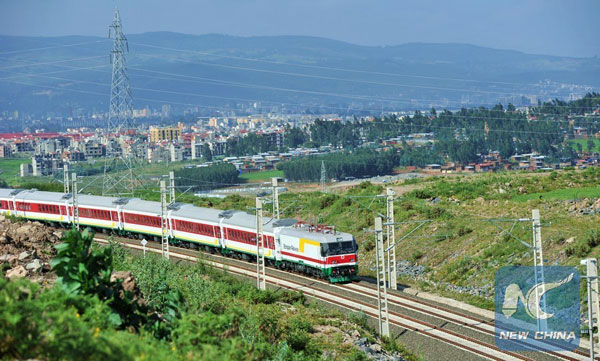Location makes Djibouti a major African entry point
Djibouti is not only rapidly becoming an investment destination for Chinese enterprises, but is also a springboard for investing in the East African region.
Djibouti is not only rapidly becoming an investment destination for Chinese enterprises, but is also a springboard for investing in the East African region.
The state-of-the art ports, its political stability, friendly investment environment and recently launched international free trade zone are key factors making the Horn of Africa country a favorable trade hub for Chinese enterprises. In addition, China's Navy launched it first overseas logistics supply base in the country last year.

Xie Zhiliang, vice-president of the marketing center for Chongqing Wanhu Industrial Group, says the Djibouti government is open to foreign direct investment, the policy framework is friendly to investors, the people are friendly and the country is politically stable.
He adds that the country's location is strategic for foreign investors. Located on two of the world's busiest maritime routes, Djibouti is an important entry point into the African market for global commerce.
The country is also a crucial site on the routes of the China-proposed Belt and Road Initiative.
"We can easily ship our products from China to East African countries, thanks to Djibouti's state-of-the art ports and the Ethiopia-Djibouti railway line," he says.
Xie says his company, which has been exporting motorized tricycles and agricultural machinery to Djibouti for the past two years, plans to use Djibouti as its base to supply products to such nearby countries as Ethiopia, Eritrea, Somalia, Kenya and Tanzania.
Henry Zhang, the East African managing director of Beijing Midea Overseas Engineering and Technology Co Ltd, says the African market has a bright future.

He says the ports in Djibouti and the Ethiopia-Djibouti railway will help his company to provide its products to neighboring countries, especially Ethiopia, one of the fastest-growing economies in Africa.
Zhang says there is soaring demand in Africa, and the continent's large number of youths is a sure indication of Africa's future economic development.
"East Africa has the highest number of youths, meaning that in the next 10 to 20 years, we will realize double-digit growth in the region," he says.
Zhang says East Africa is at the level that China was at 30 years ago, and he expects that within the next 20 years, the region will realize substantial growth. He believes Africa is the best destination for long-term investors.
Anna Lei, the CEO of BS Power, says the recently launched Djibouti International Free Trade Zone will greatly help Chinese investors to establish and grow their businesses in Djibouti and the entire region.
The zone, which is connected to the main ports of Djibouti, provides a wide range of world-class benefits, such as zero percent corporate, income and value-added tax, she says. The zone aims to diversify the country's economy by building a solid manufacturing base, creating jobs and attracting foreign investments.
Lei says her company will use Djibouti as its base to supply diesel and gas generators to other African countries.
"In the near future, we may consider setting up a factory here, so that we can cut the importation costs as well as easily access the African market and offer job opportunities to the local people," she adds.
Xie, of Chongqing Wanhu Industrial Group, says many Chinese enterprises are interested in investing in Africa through the Belt and Road.
"Riding on the mutual trust between China and Africa, Chinese enterprises will continue to invest in the continent, not only on infrastructure development, but also help African countries establish industries in effort to realize sustainable development," he says.

